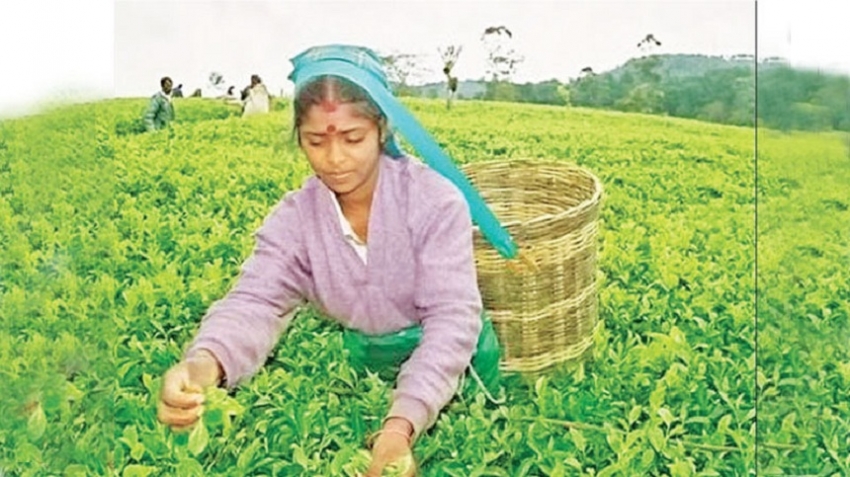The Planters’ Association of Ceylon (PA), the umbrella organization for the 22 Regional Plantation Companies calling a media briefing last week said RPCs are currently not in a position to grant a basic wage hike of Rs. 1,000 demanded by plantation workers.
“We have offered the best package for workers whose take home salary when added up with all incentives comes up to Rs. 940. Doubling the basic wage from the current Rs. 500 to Rs. 1,000 is unaffordable to RPCs who are facing problems from many fronts,” Chairman Planters’ Association Sunil Poholiyadde said.
RPC representatives said workers have been proposed a 20 percent increase on their basic wage up to Rs. 600 despite the drastic drop in global tea prices from around Rs. 750 a kg to Rs. 550 a kg. Further RPCs claim that wage incentives have been offered to workers even during dry weather conditions when yields drop.
The rising cost of production and on the other hand declining world market prices for tea and rubber is a double whammy for the plantation companies whose revenue has plummeted in the reason years due to the shrinking market share of Ceylon Tea in the global market.
The increase in production by Kenya, India and Japan have eaten into Sri Lanka’s premium tea market share which has eroded drastically over the years making the industry unsustainable according to industry experts.
Since the wage issue of plantation workers has been a recurrent problem that surfaces once in two years when the Collective Agreement comes up for renewal RPCs have proposed a hybrid model for wages of plantation workers with ‘Bloc Plucking’ an age old practice as a solution.
However, due to stiff resistance from plantation sector Trade Unions the model had to be rolled back getting back to the much viable productivity based wage increase model that was proposed at the last Collective Agreement in 2016.
“We want workers to maximize their earning capacity linked to productivity for which we have provided many incentives. We want workers to be reasonable and see facts in their proper perspective taking into account the larger picture of the industry,” Poholiyadde said.
However, according to plantation sector Trade Union officials RPCs don not recognize and reward workers who labour hard under trying conditions.
A Ceylon Workers Congress (CWC) Trade Union official said RPCs consider only their side of the story. Workers who have been battered by the high cost of living which has made existence extremely tough need a reasonable wage increase that would incentivize them to increase their output.
Presenting a different story RPCs said over 80 percent of workers in many estates go beyond the norm of plucking 16-18 kgs enabling them to earn Rs. 28.75 per every kilo.Employers’ Federation of Ceylon (EFC) Plantation Services Group Chairman Roshan Rajadurai said a worker who plucks even three kilos above the norm could earn a daily wage of over Rs. 1,000.
The current plucking average in Sri Lanka is 18 kilos whereas it is 60 kgs in Kenya and 50 kgs in South India with a norm of 40-kgs and 34 kgs respectively. In terms of daily wages a Kenyan harvester earn Rs. 443.3 and a South Indian Rs. 487.2
“Comparing the output and wages in our competitors the demand by local workers for a major wage hike is not fair. Sri Lanka’s 300 million average tea production could be easily matched by Kenya and other competitors who have increased their output at an alarming rate,” Rajadurai said.
Justifying reason for not being able to meet the expectation of plantation workers with regard to wages Rajadurai said if workers were to be given a Rs.1000 increase to their daily wage the tea auction price per kg has to go up to at least Rs. 750.“The only way such a hike could be granted is by shifting to a productivity based wage model which would mean Rs. 46 would be paid for every kilo of tea harvested,” a RPC official said.
C representatives further said companies continued to pay employees above the minimum wage of Rs. 10,000 per month. They say currently RPC workers are among the highest paid compared to tea small holder sector and garment industry workers.
Tea smallholders who account for 75 percent of the total tea production are paid a minimum of Rs. 26 per kg of green leaf without EPF, ETF, maternity benefits, gratuity, holiday pay, attendance bonus, profit share, maternity care and day care offered by RPCs.
A worker was paid a basic salary of Rs. 500 under the last Collective Agreement, in addition to an attendance incentive of Rs. 60, a productivity incentive of Rs. 140, a price share supplement of Rs. 30 and Rs. 75 as EPF/ETF making up to a daily wage of Rs. 805.
ng its last offer RPCs have proposed a 20 percent hike on the basic wage up to Rs. 600, a 33 percent increase in the attendance incentive going up to Rs. 80, a 20 percent increase in EPF/ETF up to Rs. 90 in addition to the productivity incentive and price share supplement making up a total daily wage of Rs. 940 which is an average increase of Rs. 3,375 per month a worker.
Director General EFC Kanishka Weerasinghe said increasing the basic wage of employees is not sustainable in any industry. A sustainable wage model that would support the industry and the worker is the best solution to overcome wage issues. The plantation sector wage hike negotiations which have reached a deadlock will continue according to RPC officials.




















